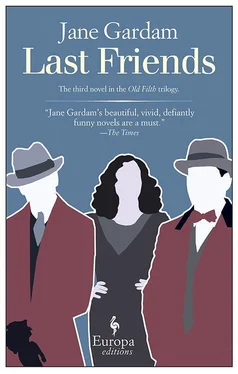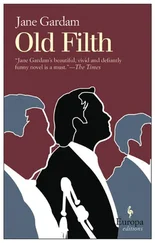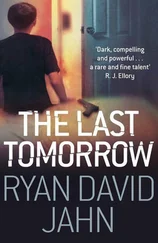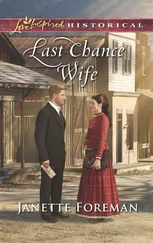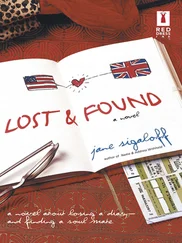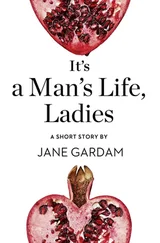‘Quite a stink there sometimes now,’ said a new Queen’s Counsel going by with tipping wine glass.
‘I think you should qualify that,’ said Herman, but the Silk had faded away. ‘Granny, nobody’s talking to me.’
‘Why should they?’
‘And there’s no music.’
‘Well, I don’t think Old Filth was — big — on music, darling.’
‘Veneering was. I liked Mr. Veneering better anyway.’
‘So you always say,’ said his mother. ‘I don’t know how you knew anything about him. And he was Sir Terence. Terry Veneering.’
‘Gran, I was nine. He was at your house. His hair was like threads and queer yellow. He played The Blues on your piano. Gran, you must remember. There was an awful man there, too, called Winston Smith or something. Like 1984 . I hope the Winston Smith one’s dead like most of these here. Why’s Mr. Veneering dead? He noticed me. I’ll bet he was an American. They never forget you, Americans. Mr. Feathers’ (‘Sir Edward,’ said Dulcie) ‘never had a clue who I was.’
‘Taxi now, Herman. Stop talking.’
A little old man seemed to be accompanying them as they left the party.
They had seen him in the church with a second-class railway ticket sticking up from his breast pocket.
When they climbed in to their waiting taxi he climbed in with them. ‘Dulcie,’ he said, ‘I am Fiscal-Smith.’
The name, the face had been at the rim of Dulcie’s perception all day, like the faint trail of light from a dead planet. Fiscal-Smith!
‘But,’ she said. ‘You told me you were never coming to London again after Veneering’s party. I mean Memorial. Don’t you live somewhere quite north?’
‘Good early train. Darlington,’ he said. ‘My ghillie drove me down from The Hall. Two hours King’s Cross. Excellent.’
‘What’s a ghillie?’ asked Herman.
‘You know, Dulcie, that I never miss a memorial service. I wouldn’t come down for anything else. Well, perhaps for an Investiture—. And you’ll remember, I think, that I was Old Filth’s best man. In Hong Kong. You were there. With Willie.’
‘Yes,’ said Dulcie — in time — her eyes glazing, remembering with terrible clarity that Veneering of course was not present. Not in the flesh.
Fiscal-Smith was never exactly one of us, she thought. No-one knows a thing about him now. Jumped up from nowhere. Like Veneering. On the make all his life. In a minute he’s going to ask to come back to Dorset with us for a free bed-and-breakfast. He’ll be asking me to marry him next.
‘I’m nearly eighty-three,’ she said, confusing him.
He took his cheap-day second-class rail ticket from his pocket and read it through. ‘I was just thinking,’ he said, ‘I might come back with you to Dorset? Stay a few nights? Old Times? Talk about Willy? Maybe a week? Or two? Possiblity?’
In the train he sat down at once in Herman’s reserved seat. ‘That,’ said Herman, ‘is not legal.’
‘Justice,’ said Fiscal-Smith, ‘has nothing to do with Law.’
‘Well you’ll have to help me to get Mother out,’ said Susan. ‘Tisbury has a big drop.’
‘I wouldn’t mind a big drop now,’ said Fiscal-Smith, ‘or even a small one. Will there be a trolley?’
* * *
There was not. The journey was slow. Fiscal-Smith had trouble with the ticket inspector, who was slow to admit that you have a right to a first-class seat with only the return half of a Basic, Fun-day Special to another part of the country. Fiscal-Smith won the case, as he had been known to do before, through relentless wearing down of the defence, who went shakily off through the rattletrap doors. ‘Ridiculous man. Quite untrained,’ said Fiscal-Smith.
The train stopped at last at Tisbury, waiting in the wings for the down-line train to hurtle by. ‘Excellent management,’ said Fiscal-Smith as they drew up on the platform and the usual Titanic-style evacuation took place from its eccentric height, passengers leaping into the air and hoping to be caught. ‘Very dangerous,’ said Fiscal-Smith. ‘Very well-known hazard this line. “Every man for himself”,’ and then completely disappeared.
Dulcie and Susan were rescued by the intellectual family man who came running up the platform to take Dulcie in his arms and lift her down.
‘How well you can run,’ she said to him. ‘Your legs are as long as dear Edward’s. An English gentleman could always be identified by his long legs you know, once. Though in old age they all became rather floppy in the shanks.’ Seeing suddenly Old Filth’s rotting remains in the English cemetery in Dacca and nobody to put flowers on them, her pale eyes filled with tears. Everyone gone now, she thought. Nobody left.
‘Come on back with us,’ said the family man, ‘It’s a foul night. I’ll drop you at home. We have a car rug,’ but she said, ‘No, we’d better stay together. But you can have Fiscal-Smith,’ she added, which he seemed not to hear. Fiscal-Smith had already found Susan’s old Morris Traveller in the car park and was fussing round it.
‘Well, keep our lights in view,’ called the family man, who was at once invisible through the murk and lashing rain.
As Susan drove carefully along behind, they all fell silent as they passed Old Filth’s empty house, in its hollow. Dulcie didn’t peer down at it, thinking of all his happy years, his steady friendship and noble soul. What Fiscal-Smith was thinking it was hard to say. The car swished through lakes of rain in the road, the deluge and the dark. All looked straight ahead.
* * *
They began to speak again only as they reached Privilege House where in minutes lights blazed, central heating and hot water were turned up higher, soup, bread and cheese appeared and the telly was switched on for the News. The smell of fat, navy-blue hyacinths in bowls set heads spinning and the polished blackness of the windows before the curtains were drawn across showed that the wet and starless world had passed into infinite space. Dulcie thought again about the last scene of the last act.
‘Why were all the lights on in his house?’ asked Herman.
‘Whose house? Filth’s?’ said Susan. ‘They weren’t. ‘It’s been locked up since Christmas. Chains on the gates.’
‘Didn’t notice the gates,’ said Herman, ‘but the lights were on all over it. In every room. Shining like always. But there seemed to be more than usual. Every window blazing.’
‘I expect it has caught fire,’ said Fiscal-Smith, searching out Dulcie’s drinks cupboard, as old friends are permitted to do.
The next morning Dulcie awoke in her comfortable foam-lined bed with a sense of unrest. Her window was open in the English tradition, two inches at the top for the circulation of refreshing night air (how they had dreamed of it in all their years in Hong Kong) long before the European central-heating. In their native English bedrooms Dulcie and Willy had always eschewed central-heating as working-class.
Outside was country silence except for the clatter of an occasional wooden-looking leaf from the Magnolia Grandiflora hitting the stone terrace. Her watch said 5 A.M. Excellent! She was in time for Prayer for the Day on faithful BBC four, which she still called the Home Service.
Where was she? Was it today they had to go to London to dear Eddie’s thing? No, no. They’d done that. Flames , she thought, Flames. Ashes to ashes —, and drifted off to sleep again.
* * *
Quite soon she woke once more, the flames retreating. She trotted downstairs in slippers and her old dressing-gown of lilac silk, feeling a sort of twitch in a back molar. Oh dear. Time for a check-up. So expensive. Own teeth every one of them. Thanks to Nannie. A full five minutes brushing morning and night. More than the teeth at yesterday’s party—. Oh, the awful rictus grins! And the bridges ! You could see them. Queen Elizabeth the first who never smiled. The old Queen Mother who never stopped, and should have done. Early-morning tea.
Читать дальше
